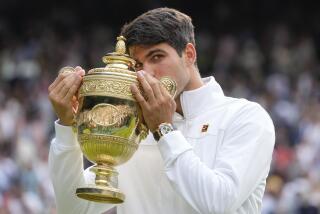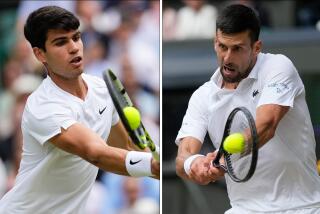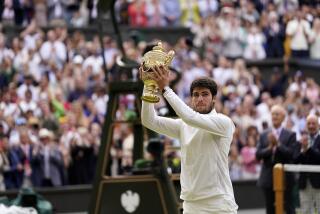WIMBLEDON TENNIS CHAMPIONSHIPS : Edberg Lowers the Boom on Becker
- Share via
WIMBLEDON, England — Late in the afternoon, some sunshine splashed across Centre Court. It was a darkened arena most of the day, as often covered by tarps as by clouds. But finally brightened, it produced one of those moments that seem to make this peculiar fortnight worthwhile: Stefan Edberg, standing at the net, daring Boris Becker to pass him, and then, the match point won, pitching backward onto the grass.
The Wimbledon tennis championships, with their special tribulations, have a way of converting stoic athletes into spontaneous creatures. Last year a man scampered up the stands after winning match point, ignoring the customs imposed by royalty, or whoever runs this event. This year a particularly bland young fellow was reduced to a wandering, grinning fool. Edberg, expressionless in this tournament and perhaps much of his 22 years, left his racket behind at the net and, smiling helplessly, walked over to the umpire’s chair in a kind of stupor.
And so another man, surviving a draw of 128 players and a year’s worth of weather in a day, was happily discombobulated. Poor Edberg: the Wimbledon photographers even got him to kiss the trophy for them. About nine times.
Edberg, seeded third, had earned his place in the sun. He had derailed that big West German locomotive, Boris Becker, with little trouble. The match took two days to play, but the time had more to do with available sunlight than difficulty. Edberg, with a gathering momentum, beat a two-time Wimbledon champion, 4-6, 7-6, 6-4, 6-2. Toward the end, to tell you the truth, the only real tension was whether rain would once more interrupt play.
To give you an idea, Becker had a break point on Edberg way back in the second set, failed to get it and never threatened the Swede’s serve again.
Nor did the weather. The match began Sunday but was halted with Edberg leading, 3-2, in the first set.
Monday’s skies looked no friendlier, and when the players returned at 12:56 p.m., Edberg having just eaten a big lunch (“unlucky,” he shrugged), it wasn’t for long. They got in 16 more minutes of tennis, Becker breaking Edberg’s serve once, but failing to break it a second time on set point. Then they were chased back to the locker room by another downpour, Becker leading, 5-4.
The next time they came back, at 2:59 p.m., it was to stay. Becker’s bolts from serve quickly gave him the first set, 6-4.
But after that, Becker’s serve began to retreat just as the thunderheads would. Edberg returned everything and then, on his own serve, cut Becker down from the net. From there he volleyed as never before, reaching everything and dumping it beyond Becker’s considerable reach.
Becker, though seeded sixth, was the probable winner going in. Just 20, he seemed entirely back to the form that won him his 1985 and 1986 Wimbledons. He didn’t lose a set until he got to his semifinal match with top-seeded Ivan Lendl. He played the tournament’s best tennis, and maybe even its best players. Before Lendl, he dispatched defending champion Pat Cash with a delightful ease.
Perhaps he played too much good tennis and too many good players. “When I finally played him,” Becker said later, “I had the feeling that I had been here already too many days.”
He should have thought about Edberg, but he hadn’t really, not since beating him in the final of the Queen’s Club tournament, a grass-court warmup for Wimbledon. Becker noted proudly that a little bit of his gamesmanship--raising his hand during Edberg’s serve--caused the Swede to double-fault.
Edberg, who won the 1985 and 1987 Australian Opens, those when they were still on grass, acquired some toughness during this tournament, though. He was down two sets to love in a semifinal match with Miloslav Mecir and came back to win.
“So I had it in my mind, going into this match,” Edberg said, “that I never give up.”
Becker did not test his toughness, however. Except for the seventh game in the second set, Edberg did not face a break point in the last three sets. In the second set, there were no service breaks of either player, but Edberg took the drama out of the tiebreaker, winning the first five points and closing it out with a 7-2 edge. And Becker wasn’t pressing much action on his own serve. In fact, and isn’t it curious, it was Becker who double-faulted to lose his serve in the first game of the final set.
They played in a drafty chill, a typical summer day for these parts, but Becker managed to heat up in some frustration. In the third set, Edberg went ahead, 3-0, and Becker tossed his racket. In this neighborhood, that’s called racket abuse, although he wasn’t penalized for it. And later, as it became apparent that he wouldn’t be passing Edberg much at the net, or even scare him off with that huge serve, Becker began talking to himself; he was quite animated.
Finally, all you could take from his usually colorful on-court demeanor was surrender. With Edberg leading, 5-1, in the final set, a piece of cellophane floated over Centre Court. Becker, who was serving, did a nice double take, and then lobbed a ball toward it, as if to bring it out of the sky. Not even he could take the game seriously at that point.
Becker may have had better matches, but not Edberg, the first Swede to win the title since Bjorn Borg.
“Normally when he plays me,” Edberg said, “he serves out of his mind.” But this time was different. “I hit a lot of returns back into his court that were causing him a lot of trouble. I could hardly miss the ball.”
The match might have turned on that break point, midway in the second set. If Becker had won the point? “Hard to say,” Edberg said. “It would have been harder for me.” For Becker, it wasn’t at all hard to say. “I think it would have been over.”
But he didn’t get that point or many others. Match point was typical. After a furious exchange of shots, with Edberg unmoving at the net, Becker had the choice of just about the entire court.
“He could have hit it anywhere to make the point,” Edberg said, still marveling afterward. “But he waited too long.” Becker firmly stroked it back into the net, and back went Edberg in relief and celebration.
Becker clambered over the net to offer his congratulations, but he didn’t seem too shook up about it. You don’t need a weatherman to know which way the wind blows. He complained lightly about the pace of his own tournament, which loaded so many tough matches up front.
“It was just a pity it was not over on Saturday,” he said, referring to the rain-forced conclusion of his match with Lendl. “I beat the defending champion, I was feeling No. 1. And then I went to play the final match and it was, like, what the hell am I still doing here?” Then: “I’m still human, you know.”
All in all, he did better than last year when, as a cocky defending champion, he was bombed out in the second round.
Edberg now faces the burden of this defense. Winning this offers its own peril; ask Becker or Cash. So, “Has winning Wimbledon changed you?” was one of the first questions. Edberg, grinning only a little less now, said, “It hasn’t changed me yet.” And then he was off into London’s cloudy night.
Because of on-and-off rain, none of the doubles championships were decided until Monday.
In men’s competition, Ken Flach and Robert Seguso beat Anders Jarryd of Sweden and John Fitzgerald of Australia, 6-4, 2-6, 6-4, 7-6, in a match that was spread over three days because of rain delays.
In women’s doubles, Steffi Graf of West Germany added to her women’s singles title as she and Gabriela Sabatini of Argentina held off two match points to beat the Soviet team of Larisa Savchenko and Natalia Zvereva, 6-3, 1-6, 12-10.
In mixed doubles, Sherwood Stewart and Zina Garrison defeated Kelly Jones and Gretchen Magers, 6-1, 7-6.
More to Read
Go beyond the scoreboard
Get the latest on L.A.'s teams in the daily Sports Report newsletter.
You may occasionally receive promotional content from the Los Angeles Times.










